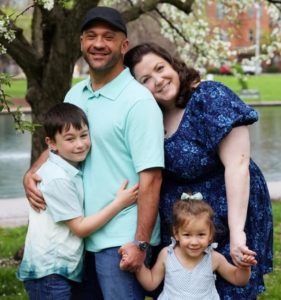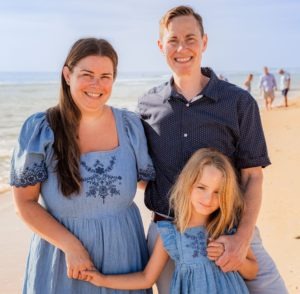A Conversation about Donor Sabbath
National Donor Sabbath is an annual observance in November where faith leaders from various religions help educate the public about the need for donation and encourage people to register their donation decision.
Bereavement Coordinator Stephanie Covitz, an ordained rabbi, and Family Services Coordinator Abby Prendergast, an ordained minister, recently shared their journey toward ordination and why National Donor Sabbath is so important.
Why do you feel that setting aside time and recognizing Donor Sabbath is important to the donation process?
 Stephanie: Donor Sabbath is a great opportunity for advocacy and education within our communities. Many people look to their religious or spiritual leaders and faith groups for guidance with decisions like registration and donation at a loved one’s time of death.
Stephanie: Donor Sabbath is a great opportunity for advocacy and education within our communities. Many people look to their religious or spiritual leaders and faith groups for guidance with decisions like registration and donation at a loved one’s time of death.
Unfortunately, there is still a lot of misinformation out there, including the belief that donation is “against” some religions. Donor Sabbath is an opportunity to encourage conversations on these topics, and hopefully to share accurate information.
Abby: Donor Sabbath honors a space for people of faith to acknowledge the reality of death and the gift of life that donation involves. Working with families, we often hear a concern that their religious beliefs do not allow for donation. However, there are almost no religious groups that do not allow for donation; Donor Sabbath is a chance for religious leaders to acknowledge those misconceptions.
As a Christian, I believe we are called to live as Christ lived—he gave his life for humanity, and donation gives us a way to act as Christ did.
What is your faith-based background?
Stephanie: I grew up in a household with a Jewish mother, and a father who was raised Catholic but made the decision as a teenager to no longer practice any organized religion. While I went to synagogue and celebrated Jewish holidays, I was encouraged to question and “figure out” what I believed. I knew from age 13 that I wanted to be a rabbi, mostly because I loved being Jewish and knew that I wanted to help people.
I went to Indiana University and studied psychology and Jewish studies. I then went to Hebrew Union College-Jewish Institute of Religion and received rabbinic ordination and a Master of Arts in Hebrew Letters after five years of study. During rabbinical school, I shifted my focus towards chaplaincy instead of the much more popular “congregational rabbi” path. I worked as chaplain for several local hospitals in Columbus before coming to Lifeline of Ohio.
Abby: I was ordained in Christian ministry in the United Church of Christ on April 28, 2018. I have my Master of Divinity degree, as well as a Master of Arts in Counseling, although I choose to not hold a counseling license.
I completed a residency in hospital chaplaincy and served as a chaplain at OhioHealth Riverside Methodist Hospital for four years. I also served at David’s United Church of Christ as their Minister of Preaching and Worship, creating and leading worship services three times a week.
I am a liturgy and worship planner, currently working on a series of reflections on the festivals of saints, aimed at progressive Christians. I still preach on my off weekends from Lifeline of Ohio, covering for pastor friends when they take much needed time off!
How will you observe the Donor Sabbath?
Stephanie: I’m planning to connect with the rabbis at my family’s congregation and share information about our lifesaving and healing work. Donation may be something that they choose to speak on for a sermon, but at a minimum they will know that I can be a resource to anyone in the community with questions.
Abby: I plan to participate in my regular spiritual practice of Lectio Divina “divine reading,” which is time spent in reflection on a selection of scripture and finding ways in which it connects with and enhances my life. This time will also allow me to reflect on this past year and remember the families with whom I worked; I will most likely write a short liturgy for their grief and the hope of donation.
In your opinion, what’s the most important part of Donor Sabbath?
Stephanie: While you may not be involved with a religious community, there is a good chance that you know friends and family who are. Take the opportunity of Donor Sabbath to connect with a local faith community and share information and resources.
Abby: Donor Sabbath is a wonderful opportunity to examine your own faith, your own guiding practice, your own values to truly see how organ, eye and tissue donation fits into your life. If you belong to a spiritual or religious group or adhere to a particular faith tradition, it’s a reminder to learn what beliefs they have shared about donation! Donor Sabbath is also a perfect time to share your connection and donation story with your spiritual community.
